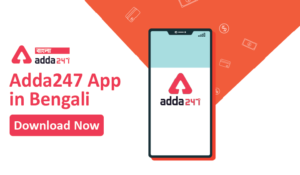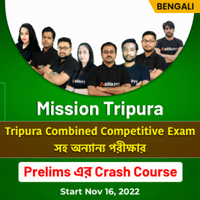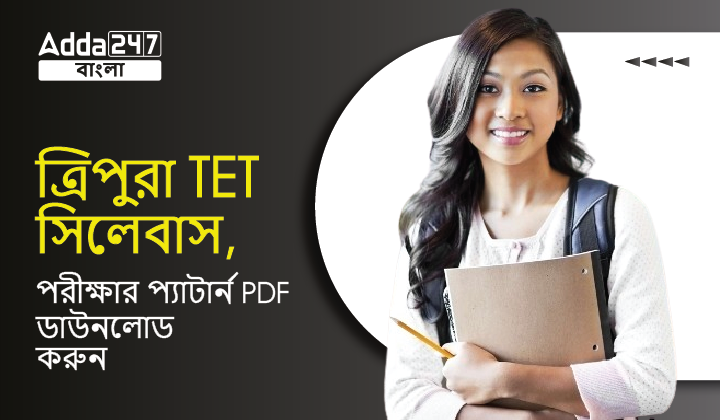ত্রিপুরা TET সিলেবাস: শিক্ষক নিয়োগ বোর্ড, ত্রিপুরা (TRBT) ত্রিপুরা TET সিলেবাস প্রকাশ করেছে তার অফিসিয়াল ওয়েবসাইটে অর্থাৎ www.trb.tripura.gov.in-এ। যারা গত কয়েক বছর ধরে ত্রিপুরা TET পরীক্ষার জন্য প্রস্তুতি নিচ্ছেন তাদের জন্য এটি একটি সুবর্ণ সুযোগ। এই আর্টিকেলে, আমরা ত্রিপুরা TET সিলেবাস এবং পরীক্ষার প্যাটার্ন বিস্তারিতভাবে প্রদান করেছি।
| ত্রিপুরা TET সিলেবাস |
| নিয়োগ সংস্থা |
শিক্ষক নিয়োগ বোর্ড, ত্রিপুরা (TRBT) |
| টপিক |
সিলেবাস |
| শিক্ষক নিয়োগ বোর্ড, ত্রিপুরা (TRBT) অফিসিয়াল ওয়েবসাইট |
www.trb.tripura.gov.in |
ত্রিপুরা TET সিলেবাস
ত্রিপুরা TET সিলেবাস: শিক্ষক নিয়োগ বোর্ড, ত্রিপুরা(TRBT) ত্রিপুরা তাদের অফিসিয়াল সাইটে অর্থাৎ trb.tripura.gov.in-এ ত্রিপুরা TET সিলেবাস প্রকাশ করেছে । যারা গত কয়েক বছর ধরে ত্রিপুরা TET পরীক্ষার জন্য প্রস্তুতি নিচ্ছেন তাদের জন্য এটি একটি সুবর্ণ সুযোগ।
প্রার্থীদের অবশ্যই ত্রিপুরা TET নিয়োগ -এ আবেদনের আগে ত্রিপুরা TET সিলেবাস সংক্রান্ত যাবতীয় তথ্য ভালোভাবে দেখে নিতে হবে | আমরা এই আর্টিকেলের মাধ্যমে ত্রিপুরা TET সিলেবাস সম্বন্ধে বিস্তৃতভাবে আলোচনা করেছি |

ত্রিপুরা TET সিলেবাস: ওভারভিউ
ত্রিপুরা TET সিলেবাস ওভারভিউ: ত্রিপুরা TET সিলেবাস ওভারভিউ নিচে একটি টেবিলের আকারে প্রদান করা হয়েছে |
|
ত্রিপুরা TET সিলেবাস: ওভারভিউ
|
| নিয়োগ সংস্থা |
শিক্ষক নিয়োগ বোর্ড, ত্রিপুরা (TRBT) |
| পরীক্ষার নাম |
ত্রিপুরা শিক্ষক যোগ্যতা পরীক্ষা (T TET) |
| ক্যাটাগরি |
সিলেবাস |
| কাজের জায়গা |
ত্রিপুরা |
| অফিসিয়াল ওয়েবসাইট |
trb.tripura.gov.in |
ত্রিপুরা TET সিলেবাস
ত্রিপুরা TET সিলেবাস: ত্রিপুরা TET সিলেবাস পেপার 1 এবং ত্রিপুরা TET সিলেবাস পেপার 2 বিস্তারিতভাবে প্রদান করা হয়েছে |
Tripura TET Syllabus Paper 1(for Classes I to IV)
PART – I: CHILD DEVELOPMENT AND PEDAGOGY
|
1. CHILD DEVELOPMENT AND LEARNING
- Growth, development, and maturation: their relationship with learning.
- Principles of development of childhood.
- Impact of heredity and environment on development: nature-nurture controversy.
- Socialization process of the child (with special reference to teachers, parents, and peers).
- Domains of development up to late childhood: physical, cognitive, emotional, social, moral, and language.
- Theories of Piaget, Kohlberg, Carol, Chomsky, Vygotsky, and Rogers in relation to child development (with critical perspectives).
- Concept of child-centric and activity-based
- Individual differences: attitude, aptitude, interest, and intelligence, their measurement.
- Language and thought
- Theories of intelligence: Spearman, Guilford, Thurstone, and Gardner – critical perspectives of the construct of intelligence.
- Gender and education: gender roles, gender bias and educational practice with special reference to child development.
- The mental health of the child: adjustment and behavioral problems during childhood.
- Understanding differences among children based on diversity of language, caste, gender, community, and religion.
- The distinction between Assessment for learning and assessment of learning: school-based assessment, continuous and comprehensive evaluation, perspectives and practices.
- Formulating appropriate questions for assessing the readiness level of learners for enhancing learning and critical thinking in the classroom, measuring the learning outcome of the learners.
|
|
2. CONCEPTS OF INCLUSIVE EDUCATION AND UNDERSTANDING CHILDREN WITH SPECIAL NEEDS
- Concept of exceptional children and children with special needs (CWSN).
- Addressing learners from diverse backgrounds including disadvantaged and deprived.
- Concept of learning disability (LD), addressing the needs of children with learning disabilities.
- Addressing the gifted, creative, and specially-abled learners (mentally retarded and physically challenged).
|
|
3. LEARNING AND PEDAGOGY:
- Process of thinking and learning of children: causes of children’s failure to achieve success in school performance with respect to quality education.
- Basic approaches to learning: processes of teaching and learning, children’s strategies of learning, learning as a social activity, social context of learning, child as a problem solver and scientific investigator.
- Alternative concepts of learning in children: understanding children’s ‘errors’ as significant steps in the learning process.
- Cognition and emotions: concept and nature of cognition, basic emotions, characteristics of childhood emotionality.
- Motivation and learning: factors contributing to learning – personal and environmental, the influence of motivation in learning.
- Classroom management: the creation of non – a threatening learning environment, and managing behavioral problems in the classroom.
- Punishment and its legal implications, rights of a child.
- Guidance and counseling: concept, nature, and types.
- Factors contributing to learning – personal and environmental.
|
PART – II: LANGUAGE – I, ENGLISH
|
LANGUAGE COMPREHENSION
(i) Two passages, one from prose and the other from poetry with questions on comprehension, inference, grammar, and test of vocabulary. (prose passage may be literary, scientific, narrative or discursive.)
(ii) Test of grammatical knowledge on the following items: –
- Determiners
- Subject-verb
- Concord
- Interrogatives
- Framing Yes/No & ‘WH’ questions
- Question tags
- Prepositions
- Tense and time
- Phrasal verbs
- Gerunds & Participle
- Auxiliary verbs
|
|
PEDAGOGY FOR LANGUAGE DEVELOPMENT
- Learning and acquisition.
- Principles of language teaching.
- A critical perspective on the role of grammar in learning a language for communicating ideas in oral and written form.
- Challenges of teaching language in diverse classrooms: language difficulties, errors, and disorders.
- Introduction to English Phonology: vowels and consonants, syllable division.
- Language skills.
- Evaluating language comprehension and proficiency in LSRW (Listening, Speaking, Reading, and Writing).
- Teaching-learning materials: textbooks, multimedia materials, and multilingual resources of the classroom.
- Strategies for teaching children with special needs (CWSN).
- Remedial teaching.
|
Part 3: Language 2: Bengali (30 MCQs) OR Part 4: Language 2: Kokborok (30 MCQs)
- The Teachers Recruitment Board, Tripura has allowed the candidates to choose from Bengali and Kokborok languages in their TET exam 2022.
- The complete Tripura TET 2022 Bengali Syllabus and the Tripura TET 2022 Kokborok Syllabus are given in the PDF links above in the article.
|
Part 4: Mathematics(30 MCQs)
- Geometry
- Shapes, spatial understanding, solids, the perimeter of rectilinear figures, area of rectangles, practical problems, surface area and volume of solids (sphere, cube, rectangular, parallelepiped), practical problems.
- Measurement
- Numbers
- Arithmetic
- Fractions
- Weight
- Time
- Data handling
- Patterns
- Money
|
PEDAGOGICAL ISSUES IN MATHEMATICS
- Language of Mathematics
- Community Mathematics
- Nature of mathematics
- Methods of teaching mathematics
- Instructional material in mathematics
- Evaluation is the concept of continuous and comprehensive evaluation. Problems in teaching mathematics
- Error analysis and related aspects of learning and teaching.
- Diagnostic and remedial teaching.
|
Part 5: Environmental Studies(30 MCQs)
- Concept and scope of environmental studies
- Significance of environmental studies.
- Integrated approach in environmental studies.
- Scope and relation of environmental studies to science and social science.
- Approaches of presenting concepts.
- Environmental studies and environmental education.
- Learning principles.
- Activities.
- Discussion.
- Health and Hygiene
- Shelters: Types of shelters, characteristics of animal shelters.
- Types of vehicles used, railways, waterways, and airways.
- Water: Types of water resources, conservation of water resources, water pollution, cause and prevention of water pollution, the impact of water pollution on the environment, flood and drought.
- Composition of air, causes and impact of air pollution on the environment, greenhouse effect, and global warming.
- Different types of soil, soil erosion, the impact of soil pollution, and its prevention.
|
Tripura TET Syllabus PAPER – II(for Classes V to VIII)
Tripura TET Syllabus – Part-1
(A) CHILD DEVELOPMENT (ELEMENTARY SCHOOL CHILD):
- Concept of development and its relation with learning.
- Growth and development, stages of development, infancy, childhood, and adolescence.
- Principles of development of childhood.
- Influence of heredity and environment on the development of a child, the role of the teachers.
- Socialization process, social world and children, the role of parents, peers, and teachers in the process of socialization.
- Piaget, Kohlberg, Vygotsky: constructs and critical perspectives, cognitive development theory of Piaget, moral development theory of Kohlberg, social constructivism theory of Vygotsky and their educational implications.
- Concept of a child–centered and progressive education, methods of teaching and learning, the concept of progressive education, the role of teachers.
- Critical perspective of the construct of intelligence, multidimensional intelligence, Sternberg’s information processing theory, intelligence tests, the concept of IQ.
- Language and thought, different stages of language development, the role of a teacher in the process of language development.
- Gender as a social construct, gender roles, gender – bias and educational practices, gender equality, and teachers’ role.
- Individual differences among learners, understanding differences based on diversity of language, caste, gender, community, and religion, etc.
- The distinction between assessment for learning and assessment of learning, school-based assessment, continuous and comprehensive evaluation, perspectives, and procedures.
- Formulating appropriate questions for assessing the readiness levels of learners for enhancing learning and critical thinking in the classroom and for assessing learners’ achievement.
|
(B) CONCEPT OF INCLUSIVE EDUCATION AND UNDERSTANDING CHILDREN WITH SPECIAL NEEDS
- Addressing learners from diverse backgrounds, including the disadvantaged and deprived, has educational implications.
- Addressing the needs of children with learning difficulties, impairment, etc., mentally retarded, physically challenged socially and culturally deprived, identification and remedial measures.
- Addressing the needs of exceptional children, talented, creative, and specially-abled learners.
|
(C) LEARNING AND PEDAGOGY
- The basic process of teaching and learning, children’s strategies of learning, learning as a social activity, and social context of learning.
- Creative learning situations, criteria of learning experiences, different modes of learning, social learning, cooperative and collaborative learning, group discussion, and role of teachers.
- Child as a problem solver and a scientific investigator.
- Alternative conceptions of learning in children, understanding children’s errors as significant steps in the learning process.
- Cognition: its process, perception, concept formation, thinking, imagination, reasoning – inductive and deductive, problem-solving, and memory.
- Emotion: characteristics, emotional maturity, emotional intelligence, emotional quotient (EQ).
- Motivation: concept, types and importance, theories of motivation.
- Motivation and learning: factors affecting learning, theories of learning – Pavlov, Thorndike, Skinner, Piaget, and Vygotsky.
- Factors contributing to learning: personal and environmental.
- Personality and adjustment: concepts, approaches, types and traits, measurement of personality, projective and nonprojective techniques and adjustment mechanisms.
|
PART – II; LANGUAGE – I, ENGLISH
| LANGUAGE COMPREHENSION
(i) Two passages, one from prose/drama and the other from poetry with questions on comprehension, inference, grammar, and test of vocabulary. (Prose passage may be literary, scientific, narrative, or discursive).
(ii) Test of grammatical knowledge on the following items:
- Concord
- Question tags
- Prepositions
- Tense and time
- Determiners
- Phrasal verbs
- Gerunds
- Error identification
- Modals
- Degree of comparison
- Transformation of sentences
|
PEDAGOGY FOR LANGUAGE DEVELOPMENT
- Language acquisition and learning.
- Principles of language teaching.
- Language skills – strategies to develop them.
- A critical perspective on the role of grammar in learning a language for communicating ideas in oral and written form.
- Challenges of teaching language in diverse classrooms – language difficulties, errors and disorders.
- Introduction to English Phonology – vowels and consonant classification as per IPA, syllable division.
- Teaching-learning materials: textbooks, multimedia materials, ICT, and multilingual resources of the classroom.
- Evaluating language comprehension and proficiency in LSRW (listening, speaking, reading, and writing)
- Strategies for teaching children with special needs (CWSN).
- Remedial teaching.
|
Part 3: Language 2 Bengali (30 MCQs) and Part 4: Language 2 Kokborok (30 MCQs)
|
Teachers Recruitment Board, Tripura has notified that the candidates can choose from Bengali or Kokborok language in their TET exam.
The complete Tripura TET Bengali Syllabus and the Tripura TET Kokborok Syllabus are given in the PDF links above in the article.
|
Part 4: Mathematics & Science(60 MCQs)
MATHEMATICS (30 MCQs)
- Number System: whole numbers, positive and negative integers, rational numbers-their properties, fractions, and decimals.
- Algebra: Formation of algebraic expressions, an idea about monomials, binomials and Polynomials,
- addition, subtraction, multiplication, and division of algebraic expressions.
- Arithmetic: Square and square root, cube and cube root, ratio and proportion, inverse proportion
- as proportionality with the reciprocal, percentage, profit and loss, simple and compound interest.
- Geometry: basic geometrical ideas (2-D), understanding elementary shapes (2-D and 3-D).
- Lines and angles, triangles and their properties, congruence of triangles, classification of quadrilaterals as rectangle, square, rhombus, parallelogram, trapezium, and their various
- Mensuration: Perimeter and area of rectangle, square, parallelogram, rhombus, trapezium, triangle, and circle.
- Data handling: Graphical representation, representing numerical data, pictographs, bar graphs,
- double bar graphs,s and pie charts, representing numerical data as frequency table, mean, median, mode, and their applications.
|
SCIENCE (30 MCQs)
- Food and Nutrition
- Microorganism and activities
- Circulation and conduction
- Ecosystem and Natural Resources
- Agriculture and Tools
- Pollution: types of pollution and pollutants, greenhouse effect, global warming, acid rain, impacts of different types of pollutants
- Motion, Force, and Pressure: rest and motion, graphical presentation of straight line motion,
- Newton’s laws of motion and their application,
- Thermal Physics: heat and temperature, thermal conductivity, radiation, application of thermal
- insulators, thermometer.
- Sound: characteristic of sound, application of sound, the intensity of sound, sound pollution.
- Electrostatics, current electricity and magnetism, frictional electricity, electroscope, earthling,
- lightning, electric current and circuits, electric cell, heating, chemical and magnetic effects of
- current, magnets, properties of the magnet, applications, earth’s magnetism.
- Optics: reflection in a plane and spherical mirrors, the image in lenses.
- Solar System: sun, planets, satellite, comets, galaxy.
- Metal and Non-metal\
- Geography as a social study and as a science.
- The Solar System.
|
Part 5: Social Studies(60 MCQs)
GEOGRAPHY (15 MCQs)
- Globe, Latitudes and Longitudes.
- Interior of the Earth.
- Rocks: types and characteristics.
- Geography is a social study and science.
- The Solar System.
- Our changing earth
- Geomorphic process
- Atmosphere
- Hydrosphere
- Economic geography
- Agriculture
- Industry
- Human Environment
- Physical Environment
- Pollution of air and water, deforestation and its impact, ozone depletion, and greenhouse effect.
- Concept of hazard and disaster, industrial hazard, biological hazard, wildfire hazard, landslides.
- India as a physical unit (relief drainage).
- Forest, mineral, and power resources of Tripura
|
HISTORY (15 MCQs)
- Civilization
- Sixteen Mahajanapadas and the First Empire
- Sultans of Delhi
- Beginning of the Mughal Rule
- The Establishment of Company Power in India
- The National Movement
- India after Independence
- Tribal Society and Festivals of Tripura
|
SOCIAL AND POLITICAL LIFE (15 MCQs)
- Diversity in Indian Society
- Democracy, Government, Legislature, Executive, Judiciary, the Constitution of India, Parliamentary
- System of Government, Central Government, State Government, Local Self-Government in Tripura, Election Process in India
|
PEDAGOGICAL ISSUES IN SOCIAL STUDIES (15 MCQs)
- Concept and Nature of Social Studies/ Social Science.
- Nature, Scope, and Significance of Social Science Curriculum
|
ত্রিপুরা TET পরীক্ষার প্যাটার্ন
ত্রিপুরা TET পরীক্ষার প্যাটার্ন: ত্রিপুরা TET পরীক্ষা অনুযায়ী পেন ও পেপারে পরীক্ষা হবে। এর মধ্যে ক্লাস I থেকে IV অবধি ত্রিপুরা TET পেপার I এবং V থেকে VIII অবধি ত্রিপুরা TET পেপার II | ত্রিপুরা TET Paper I এবং ত্রিপুরা TET Paper II এর ত্রিপুরা TET পরীক্ষার প্যাটার্ন প্রদান করা হয়েছে।
Tripura TET Paper I (for Classes I to IV)
| SL.No. |
Subjects |
No. of Questions |
Marks |
| 1 |
Child Development and Pedagogy |
30 |
30 |
| 2 |
Language I (English) |
30 |
30 |
| 3 |
Language II (Bengali/Kokborok) |
30 |
30 |
| 4 |
Mathematics |
30 |
30 |
| 5 |
Environmental Studies |
30 |
30 |
|
Total |
150 |
150 |
Paper II (for Classes V to VIII)
| SL .No. |
Subjects |
No. of Questions |
Marks |
| 1 |
Child Development and Pedagogy |
30 |
30 |
| 2 |
Language I (English) |
30 |
30 |
| 3 |
Language II (Bengali/Kokborok) |
30 |
30 |
| 4 |
Mathematics & Science Social Studies/Social Science |
60 |
60 |
|
Total |
150 |
150 |
ত্রিপুরা TET সিলেবাস এবং পরীক্ষার প্যাটার্ন PDF ডাউনলোড করুন
ত্রিপুরা TET সিলেবাস এবং পরীক্ষার প্যাটার্ন PDF ডাউনলোড: প্রার্থীদের অবশ্যই ত্রিপুরা TET নিয়োগ -এ আবেদনের আগে ত্রিপুরা TET সিলেবাস এবং পরীক্ষার প্যাটার্ন সংক্রান্ত যাবতীয় তথ্য ভালোভাবে দেখে নিতে হবে | আপনারা, নিচের লিঙ্কটি ক্লিক করে ত্রিপুরা TET সিলেবাস এবং পরীক্ষার প্যাটার্ন PDF ডাউনলোড করতে পারেন |
কিভাবে ত্রিপুরা TET সিলেবাস PDF ডাউনলোড করবেন?
কিভাবে ত্রিপুরা TET সিলেবাস PDF ডাউনলোড করবেন: নিচে দেওয়া ধাপগুলি অনুসরণ করে আপনারা কিভাবে ত্রিপুরা TET সিলেবাস PD ডাউনলোড করতে পারবেন|
Step-1: “ত্রিপুরা TET সিলেবাস PDF” ডাউনলোড করতে www.trb.tripura.gov.in ওয়েবসাইটে যান।
Step-2: ‘Examination’ অপশানে ক্লিক করুন।
Step-3: তারপরে ‘ত্রিপুরা TET সিলেবাস PDF’ অপশানে ক্লিক করুন।
Step-4: ‘ত্রিপুরা TET সিলেবাস PDF’ টি ওপেন হলে ডাউনলোড করে কম্পিউটারে সেভ করে রাখুন |

Adda247 ইউটিউব চ্যানেল – Adda247 You Tube Channel
Adda247 টেলিগ্রাম চ্যানেল – Adda247 Telegram Channel
Sharing is caring!





